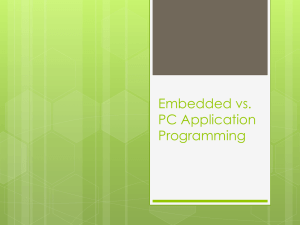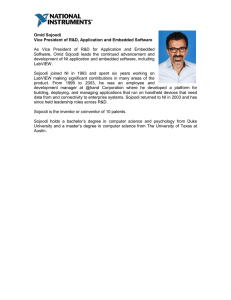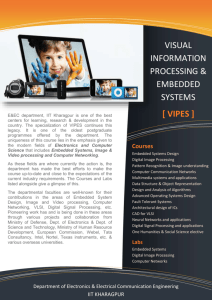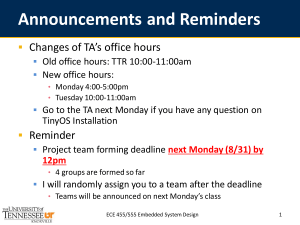Department of Electrical Engineering and Computer Science
advertisement
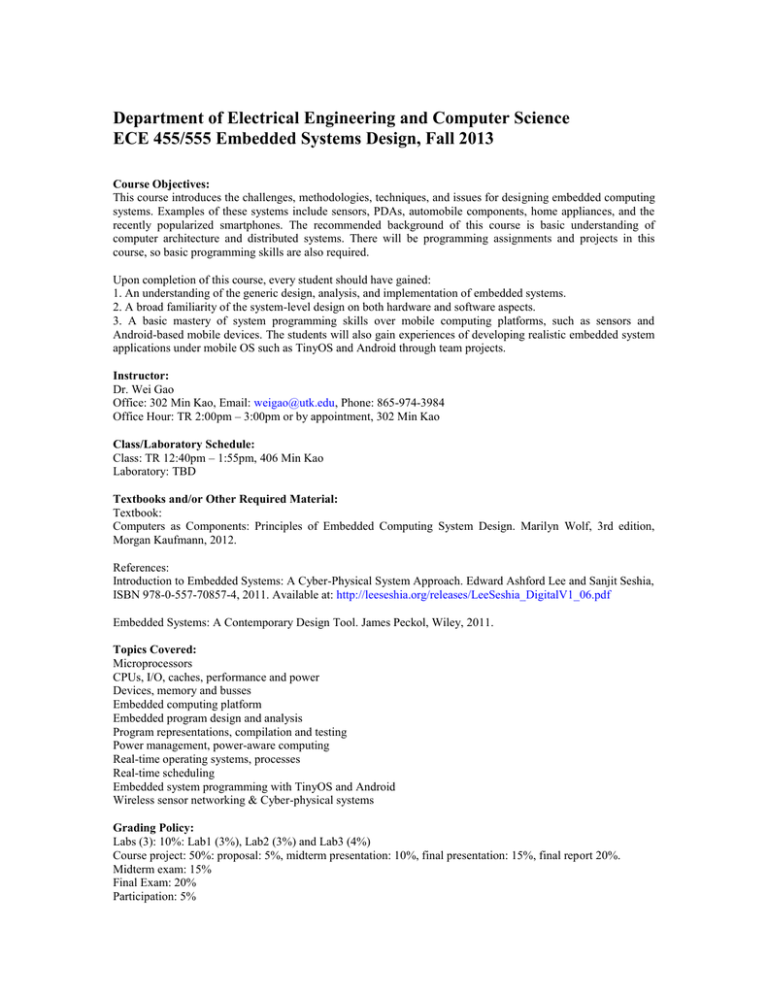
Department of Electrical Engineering and Computer Science ECE 455/555 Embedded Systems Design, Fall 2013 Course Objectives: This course introduces the challenges, methodologies, techniques, and issues for designing embedded computing systems. Examples of these systems include sensors, PDAs, automobile components, home appliances, and the recently popularized smartphones. The recommended background of this course is basic understanding of computer architecture and distributed systems. There will be programming assignments and projects in this course, so basic programming skills are also required. Upon completion of this course, every student should have gained: 1. An understanding of the generic design, analysis, and implementation of embedded systems. 2. A broad familiarity of the system-level design on both hardware and software aspects. 3. A basic mastery of system programming skills over mobile computing platforms, such as sensors and Android-based mobile devices. The students will also gain experiences of developing realistic embedded system applications under mobile OS such as TinyOS and Android through team projects. Instructor: Dr. Wei Gao Office: 302 Min Kao, Email: weigao@utk.edu, Phone: 865-974-3984 Office Hour: TR 2:00pm – 3:00pm or by appointment, 302 Min Kao Class/Laboratory Schedule: Class: TR 12:40pm – 1:55pm, 406 Min Kao Laboratory: TBD Textbooks and/or Other Required Material: Textbook: Computers as Components: Principles of Embedded Computing System Design. Marilyn Wolf, 3rd edition, Morgan Kaufmann, 2012. References: Introduction to Embedded Systems: A Cyber-Physical System Approach. Edward Ashford Lee and Sanjit Seshia, ISBN 978-0-557-70857-4, 2011. Available at: http://leeseshia.org/releases/LeeSeshia_DigitalV1_06.pdf Embedded Systems: A Contemporary Design Tool. James Peckol, Wiley, 2011. Topics Covered: Microprocessors CPUs, I/O, caches, performance and power Devices, memory and busses Embedded computing platform Embedded program design and analysis Program representations, compilation and testing Power management, power-aware computing Real-time operating systems, processes Real-time scheduling Embedded system programming with TinyOS and Android Wireless sensor networking & Cyber-physical systems Grading Policy: Labs (3): 10%: Lab1 (3%), Lab2 (3%) and Lab3 (4%) Course project: 50%: proposal: 5%, midterm presentation: 10%, final presentation: 15%, final report 20%. Midterm exam: 15% Final Exam: 20% Participation: 5% Academic Integrity: All programs turned in for credit must be each student's own work. Students must write their own programs and problem solutions from scratch independently. No collaboration is allowed for lab assignments. Closed-book exams. No discussion is allowed during exams. Any violations will result in a minimum penalty of a zero on the given assignment or exam. Disability Statement: Any student who feels s/he may need an accommodation based on the impact of a disability should contact the Office of Disability Services at 865-974-6087 in Hoskins Library to coordinate reasonable accommodations for students with documented disabilities.
